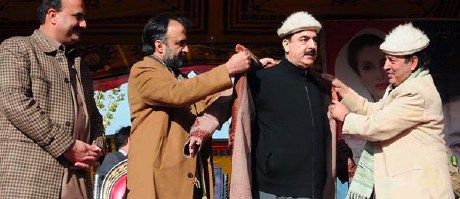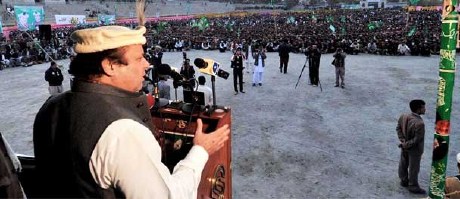Adil Najam
Today is a good day for democracy in Pakistan. The Gilgit-Baltistan region goes to poll for the first time to elect a legislative chamber of their own. Full franchise needs to be extended to each and every Pakistani, everywhere in Pakistan. One hopes that this step will be extended soon to other parts of Pakistan that remain without direct and full adult franchise.


The political implications of this step can be far reaching both for Pakistan and even beyond Pakistan. I personally think that the designation of Gilgit-Baltistan as an autonomous region is a first step towards the inevitability of the existing four provinces being sub-divided into a larger number of provinces. That prospect alone makes the political importance of this step far-reaching.
It may be too early to predict the shape of possible implications, but it is timely to think about steps than will ensure that these implications are positive for the Gilgit-Baltistan region and for the country as a whole. What is already interesting is to watch the political dynamics unleashed by these elections. Given that new ‘electoral capital’ is being created with the creation of a new Assembly, new seats, and new regional power players, it is not surprising that established political players in the rest of the country are putting their all into these elections. The biggest names in Pakistan politics are all traveling North to make sure that their party can capture this new ‘electoral capital’ and gain the advantage in future elections. This, itself, is a good sign.
The editorial in Dawn, gets it right:
AMID the disquieting news from elsewhere in the country, there is a glimmer of hope in the form of the Gilgit-Baltistan Legislative Assembly elections scheduled for tomorrow. Twenty-three seats will be contested in the new-look assembly following the federal government’s Gilgit-Baltistan Empowerment and Self-Governance Order, and the contests have attracted an impressive array of national political leaders who have gone to the area to campaign for their local candidates. Despite the push by national parties, local politics and personalities are expected to play an influential role in the elections and therefore it is difficult to predict the results. Having said that, the PPP and the PML-N (and its rump, the PML-Q) have traditionally been the dominant players and that pattern is expected to continue. The PPP will likely be boosted by the Self-Governance Order and the usual ploy of doling out state patronage in the run-up to elections. The MQM is a new player in the area and may pick up a couple of seats on the back of enticements offered to Baltistanis living in Karachi. Many, if not most, Pakistanis will be unaware of the steadily growing influence of religious extremism in the area and one positive of the high-profile campaigning by mainstream political parties may be that the space gained by extremists will be gradually rolled back.
The elections, though, will be no panacea. The usual campaign promises have been made by candidates, but the socio-economic problems are serious. For example, Gilgit city has no sewerage system or major hospital, issues that have not drawn the attention of candidates. Meanwhile, in the Ghanche district of Baltistan, a major demand of the people is the re-opening of the Kargil-Ladakh route so that families separated by the LoC can reunite or meet again, but candidates have shied away from the issue. Additionally, the federally dominated Gilgit-Baltistan Council is expected to wield the real power and the Self-Governance Order is a halfway house between local governance and full-fledged constitutional and provincial status. Still, the elections are a start and a much-needed fillip in a country reeling from dismal news.
More details on the election, from a news report in The News:
Over 7,17,286 voters will elect members of the Gilgit-Baltistan Legislative Assembly today (Thursday). More than 250 candidates are taking part in the election being held in 23 constituencies out of 24. There would be no polling in constituency GB-19 where election was postponed due to the demise of MQM candidate Sher Bahadur Khan. According to the Election Commission, 3,32,377 female and 3,84,909 male voters would cast their votes to elect 23 members for the assembly.
The Election Commission has made elaborate arrangements to ensure smooth conduct of election. It has set up 982 polling stations in all six districts of Gilgit-Baltistan, of which 253 are reserved for women while 258 for male voters. Besides 511 mixed polling stations, the Election Commission has declared 153 polling stations sensitive and 119 stations very sensitive. An election cell and a control room have also been established to address complaints or give information about the polls. Moreover, in order to conduct the election in a smooth manner, 24 returning officers and 25 assistant returning officers have been deployed while more than 3,000 polling staff has also been assigned duties on the polling day.
Foolproof security measures have been adopted under which around 5,000 security staff is deployed at the polling stations, especially the sensitive and highly sensitive stations. Two battalions of the Army have been called and moved to different areas of the region. Army soldiers would be available on a call in case of any emergency. Meanwhile, political activities and election campaign ended at midnight on Wednesday under the election order. The Chief Election Commissioner (CEC) of the area, Rahim Nawaz Khan Durrani, has directed all the district election commissioners and polling staff to ensure on time arrival at their respective stations.



















































The media should act more responsible and not jump onto the next story so quickly. The recent events of the Rawalpindi tragic terrorist blast was undermined due to the new ongoing activity in the country. Now the Charsadda bomb blast should also be reported properly unlike the Rawalpindi blast. This also addressed nicely in the following link by Sadiq Saleem:- http://pakistanwithoutterrorism.wordpress.com/2009 /11/04/sadiq-saleem-lagay-raho-media-bhai/
This is a good development for the country.
Also, I would be shocked if MQM wins anything outside of Sindh (legitimately).
I agree with the positives. Here are a few questions about possible negatives. This is a low mobility time of the year in Baltistan. Why are the elections being held now when it is difficult for voters and observers to get to the remote polling stations in the snow?
What role is Pakistan civil society playing in promoting democracy in these areas? The news coverage and editorials are based entirely on statements of the partisan political machinery and the Election Commission. I came to Pakistan to observe and monitor the 2008 elections, and I found it shameful that the civil society neglected their duties and sat out the elections.
You make a very good point. All teh parties are working so hard at this because new “electoral capital” is being constructed. Eventially this will mean parties fighting more more NA seats from Gilgit and also the Provincial government. So this could eventually begin affecting the national politics much more.
I agree this is a very good step. But I do not hold much confidence in the current leaders. But am glad that elections are extended to Gilgil too.